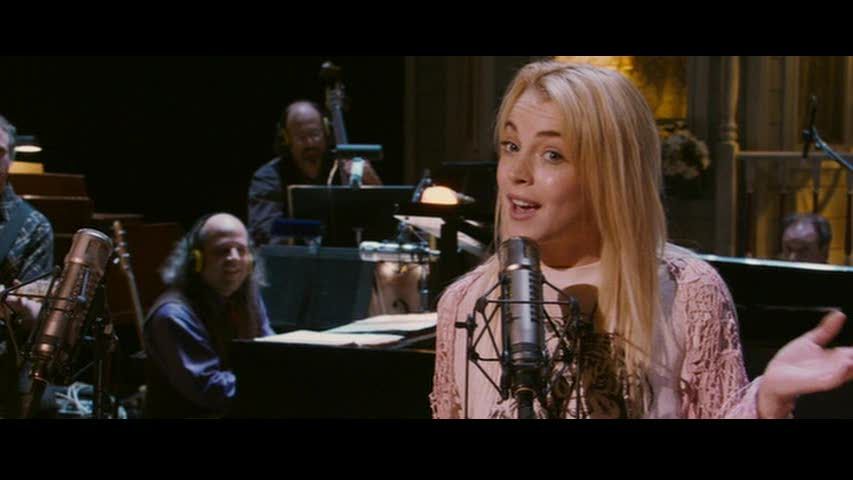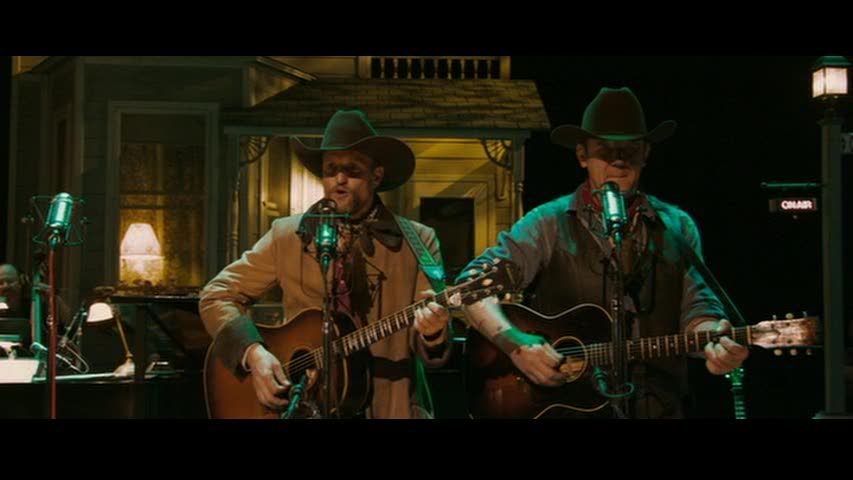
One cannot help but think of Robert Altman's final film, A Prairie Home Companion, as not only a loving tribute to the famed live country-western radio show which gave the film its name, but as a parting valedictory for Altman himself, who surely directed the film with the knowledge that it'd likely be his last. The specter of death lingers over the entire film, both figuratively (with Tommy Lee Jones as a corporate "axeman" sent to close down the show after one last performance) and literally, in the form of Virginia Madsen's angel in a white trenchcoat, a noirish avatar of death who Altman credits as the "Dangerous Woman" even though she's given an actual name in the film. The film is sanguine in the face of death, accepting it with casual good humor as a necessity of life. It's no accident that the film's bringer of death is repeatedly referred to as radiant and beautiful, fitting adjectives for Madsen, who glides around the set with a halo of bright gold hair curled tightly around her face, the stage lights reflecting off her pure white coat. She is a sensitive, empathic messenger of death, gently bringing the end even as she nurses her own obvious nostalgia for living.
The final performance of a radio show may not be a literal death, but it is an ending nonetheless, and Altman treats this event with the momentousness and the bittersweet dignity it deserves. The script was written by Garrison Keillor, the real-life host of A Prairie Home Companion, who fictionalizes and mythologizes his own show (which is still running in reality), and plays himself as well. This script is perfectly tailored to Altman's approach, weaving subtly from backstage conversations among the show's performers and crew, to on-stage musical performances. The entirety of the film takes place in a single night, the show's last night on the air and on stage, and it encompasses a broad range of country performances, most of them performed by Altman's cast along with a handful of regulars from the original radio show. Much of the film's dramatic material centers around the family of Yolanda Johnson (Meryl Streep), her sister Rhonda (Lily Tomlin), and Yolanda's daughter Lola (Lindsay Lohan). The two sisters are the last stalwarts left in a family musical group that once also included two other sisters. Both Streep and Tomlin give remarkable performances, conveying the combination of happiness, resignation, and bitterness that they each hold for their eventful but only marginally successful lives. This is most obvious in the body language of the two sisters whenever they're on stage together, as Yolanda likes to delve into her family's rich history by regaling the audience with stories before each song, while Rhonda fidgets uncomfortably from side to side, unable to meet the audience's gaze; she looks like she's impatient for the song to start. It's in wonderful little touches like this that Altman encourages his actors to bring out their characters' many facets.
The dramatic material itself is slight and elliptical, mostly limited to a handful of brief conversations in which the history of this family is broadly outlined: a childhood of poverty followed by a musical career starting at a very young age, Yolanda's chance encounter with a young man who got her started on the path to radio and also became her husband. Later, hints of a brief romance with Keillor at some point, and many amusing anecdotes along the way. These stories come out in slow drips, and Altman frequently cuts away from these conversations to check out what's happening on stage at the same time, so that there remain gaps in the chronology. It's enough to suggest a long and complex history for these characters, who then draw on this deep well in their musical performances. Indeed, the film's greatest strength is the way that character is expressed through musical performance, a throwback to Altman's other great country musical, Nashville. Streep and Tomlin's sisterly affection, romantic regrets, and melancholy over the show's closing all come out in their songs, which are heartfelt and potent; they're not just singing, but acting as well. Similarly, the aging singer Chuck Akers (L.Q. Jones) delivers an achingly beautiful final song for his last appearance on the show, his voice cracking with emotion as he reaches the end of the number before he breaks out into a smile. It's a wonderful moment, an old man bowing out while still expressing himself with every last ounce of his vitality: it must have been an especially poignant and personal scene for Altman to film.

But the film's surprising showstopper is a late-in-the-game performance from Lohan, as Yolanda's shy, bookworm-ish, suicide-obsessed daughter. She is called upon to do a song towards the end of the show when it transpires that there is some extra time, and with no preparation she is thrust on stage, singing an old outlaw ballad to which she barely knows the words. This is an astonishing performance from a young actress all too often written off as insignificant, who performs here entirely while singing, her expressive face communicating the conflicting emotions of her excitement, nervousness, and the pleasure she feels in performing. As she gets to the third verse and forgets the words, she pauses only a beat before beginning to improvise with a smile on her face, stitching together bits of her morbid poetry and the folksy song she heard her mother and aunt singing earlier in the dressing room. Altman shows the entire performance from beginning to end, and it's great fun to watch this shy young girl growing gradually more and more confident, by the end belting out the lyrics, cocking her head and swaying her body. She starts the song insecure and withdrawn, looking uncertainly over towards her mother between verses, but by the end she is totally into it, closing her eyes and throwing her head back as she winds down towards the end. Lohan mostly stays in the background throughout the rest of the film, awkwardly chatting with Keillor and other cast members in a few scenes, setting up her character for this final moment of glory when she comes out of her shell.
The film also boasts a pair of great, bawdy performances from Woody Harrelson and John C. Reilly as the cowboy singers Dusty and Lefty, whose song "Bad Jokes" is basically a loose foundation for the two guys to riff on mildly dirty puns and stories. It's pretty funny, especially to see the delight these two roughnecks get from delivering this old-timey smut, and the indignation of the stage manager (Tim Russell) when sound effects man Tom Keith begins providing an improvised accompaniment to the cowboys' raunchy stories. Harrelson also provides one of the great off-stage moments, singing an outtake he doubtless judged too risque for the broadcast version: "I used to work in Chicago. I did but I don't anymore./ A lady walked in with some porcelain skin and I asked her what she came in for./ Liquor, she said, and lick her I did, and now I don't work there anymore."
Even the show's security man, former private shamus Guy Noir (Kevin Kline), gets his moment in the musical spotlight. Guy, adapted from a character Keillor often uses in sketches on the real-life Prairie Home Companion, speaks entirely in self-consciously hard-boiled patter and narrates the film like Bogey playing Marlowe, naturally becoming infatuated with Madsen's angelic femme fatale. He gets the film's melancholy finale before the credits' raucous group reunion, a solo song at the piano that bids farewell to the country-western show as the set is disassembled behind him. It's an appropriate touch; he is a character out of his time, an icon living past his era, just as Prairie Home Companion is a throwback to an earlier, folksier era. This is a moving, rambling, and musically joyous film, a perfect send-off for a director who was always looking for ways to capture the pleasures and contradictions of life in his cinema.

5 comments:
Ed, a fine look at Altman's. last. When I saw this in the the the theater, I didn't know it would be his last. Altman gave us so much over the years, he had more professional lives than a cat. Just about my favorite American director.
You're on my blogroll, btw.
This is a terrific appreciation of a filmmaker and a warm film.
I haven't seen "PHC" since its release, but reading your review I had a foggy recollection that I'd disliked the use of Streep. I went to my off-line archive and found the following from my review at the time:
"This movie’s only significant fault is its preoccupation with Streep, who gets more close-ups than Norma Desmond even though her rambling Yolanda is mildly amusing at best -- especially next to Dusty and Lefty. Quite possibly, Altman felt pressured to give marquee minutes to his biggest star, or maybe someone thinks Streep’s singing debut will land her a 14th Oscar nomination. Whatever the reason for Streep’s showcasing, PHC is at its best as a shape-shifting headless organism. That’s why Keillor is brilliant to have deferred the star treatment that was rightfully his to claim."
Beyond that, this really is a wonderful marriage of a radio show and a director. Thanks for the thoughtful read, including keeping it real and giving due credit to Lohan.
Thanks Rick, Altman is one of my favorites too.
Jason, I thought Streep was very good (and she usually just bores me), although she and Tomlin were the worst singers in the cast. I liked the way she subtly worked the contrast between her bubbly, flitty exterior and the bittersweet emotions underneath. I probably could've done with more Dusty and Lefty, since they were hilarious, and actually more Tomlin as well -- she was given surprisingly little to do. That's just quibbling, though, and for the most part I thought the ensemble cast was well-balanced. Lohan really surprised me here, too, and made me think that she could become a great actress if she pulls herself together and gets a few more meaty roles with talented directors at the helm.
I don't think my complaint is so much with Streep's performance. I just thought Altman fell in love with her and gave her more screen time than the character deserved.
That said: Sometimes I think creative actresses like Streep are a poor fit for largely improvisational directors. I think it generates the need to "do something," which often leads to actors/actresses doing something at every moment, and thus overacting.
That's just a general comment, less about Streep and "PHC," though I have a hunch it might apply at least on some level.
Bravo for cheering Lindsay Lohan's wonderful performance in this film. I was fairly floored by her work here, and have been more than slightly depressed by the turn her career has taken.
Also, just a great post in general on a very special film...
Post a Comment